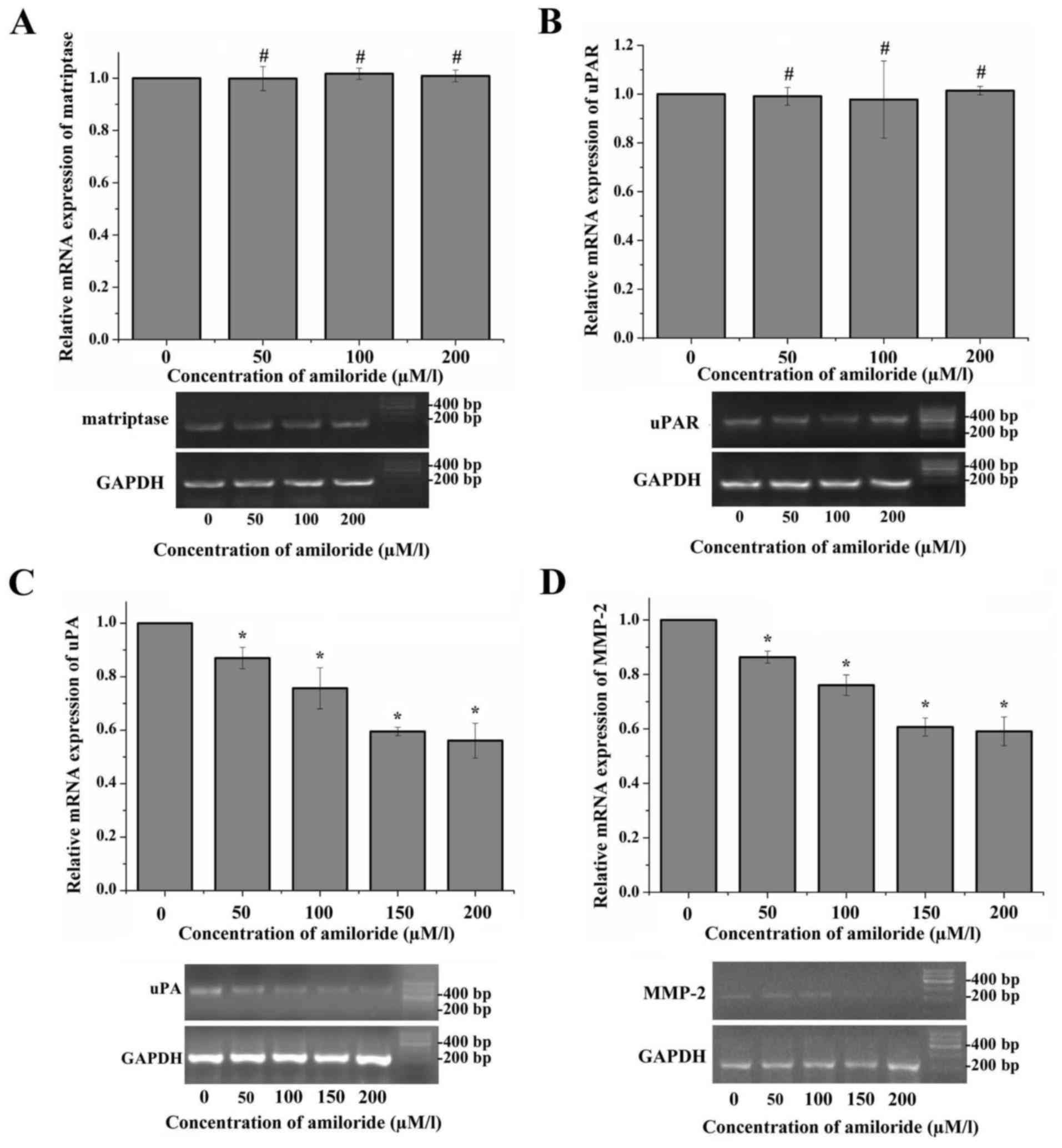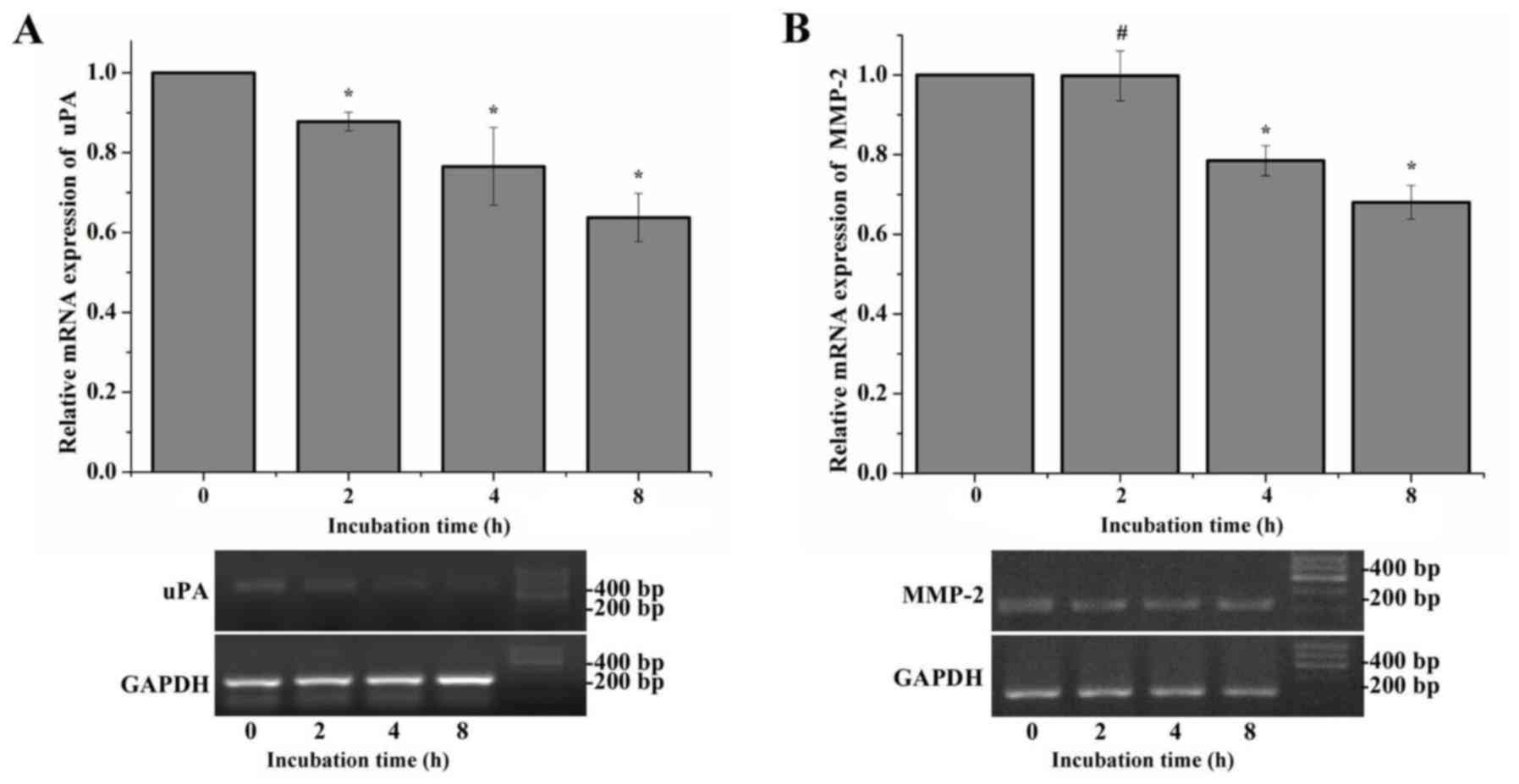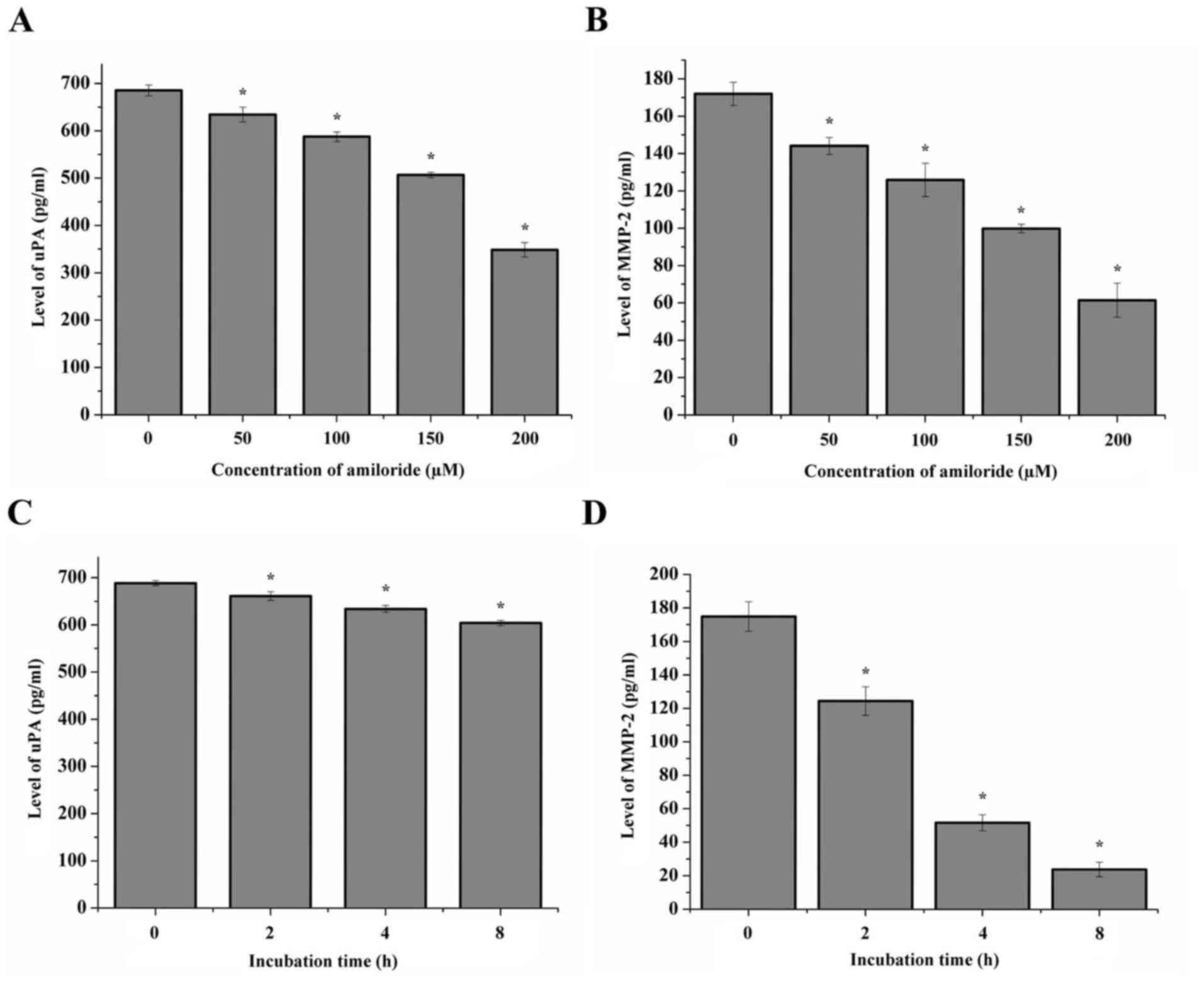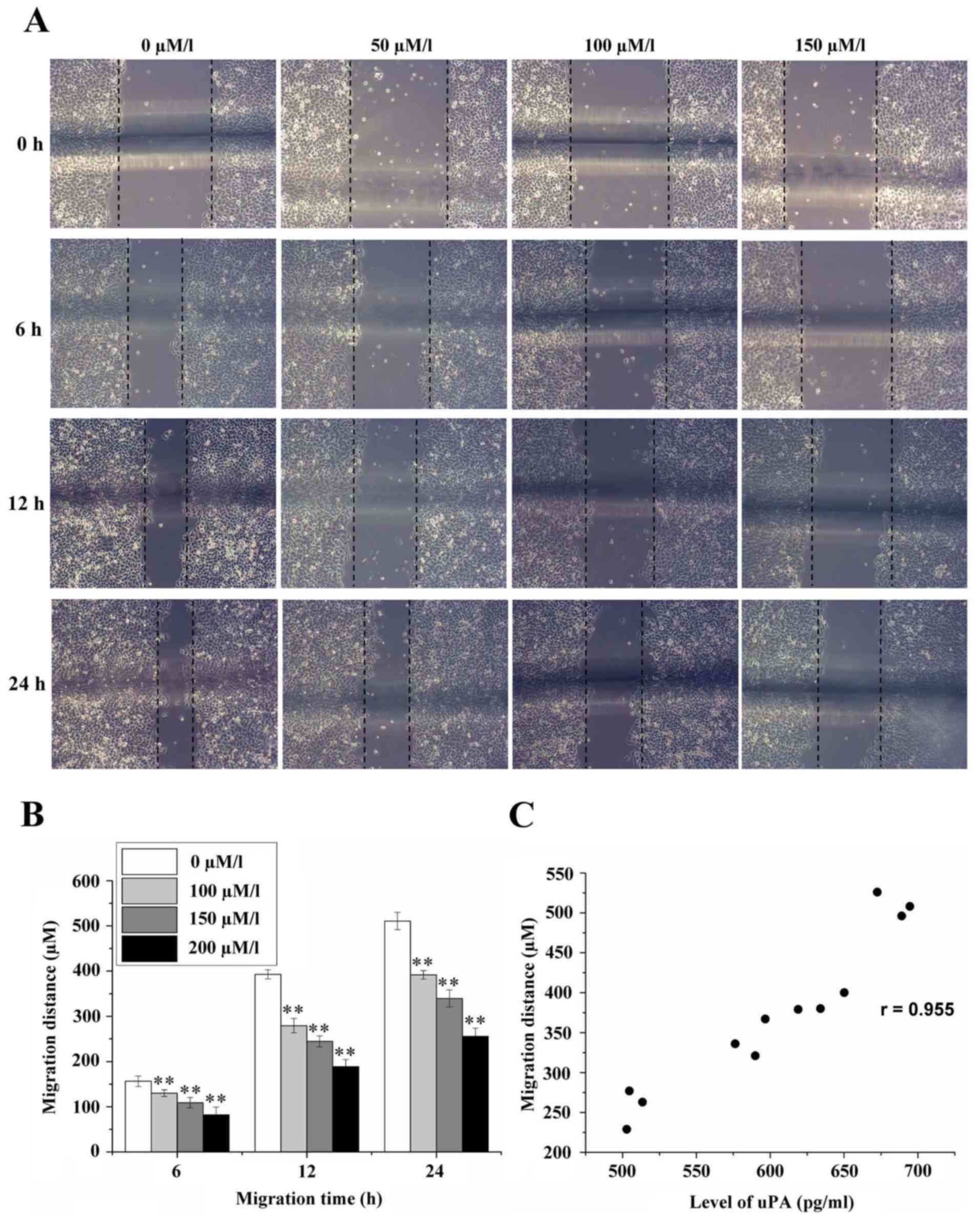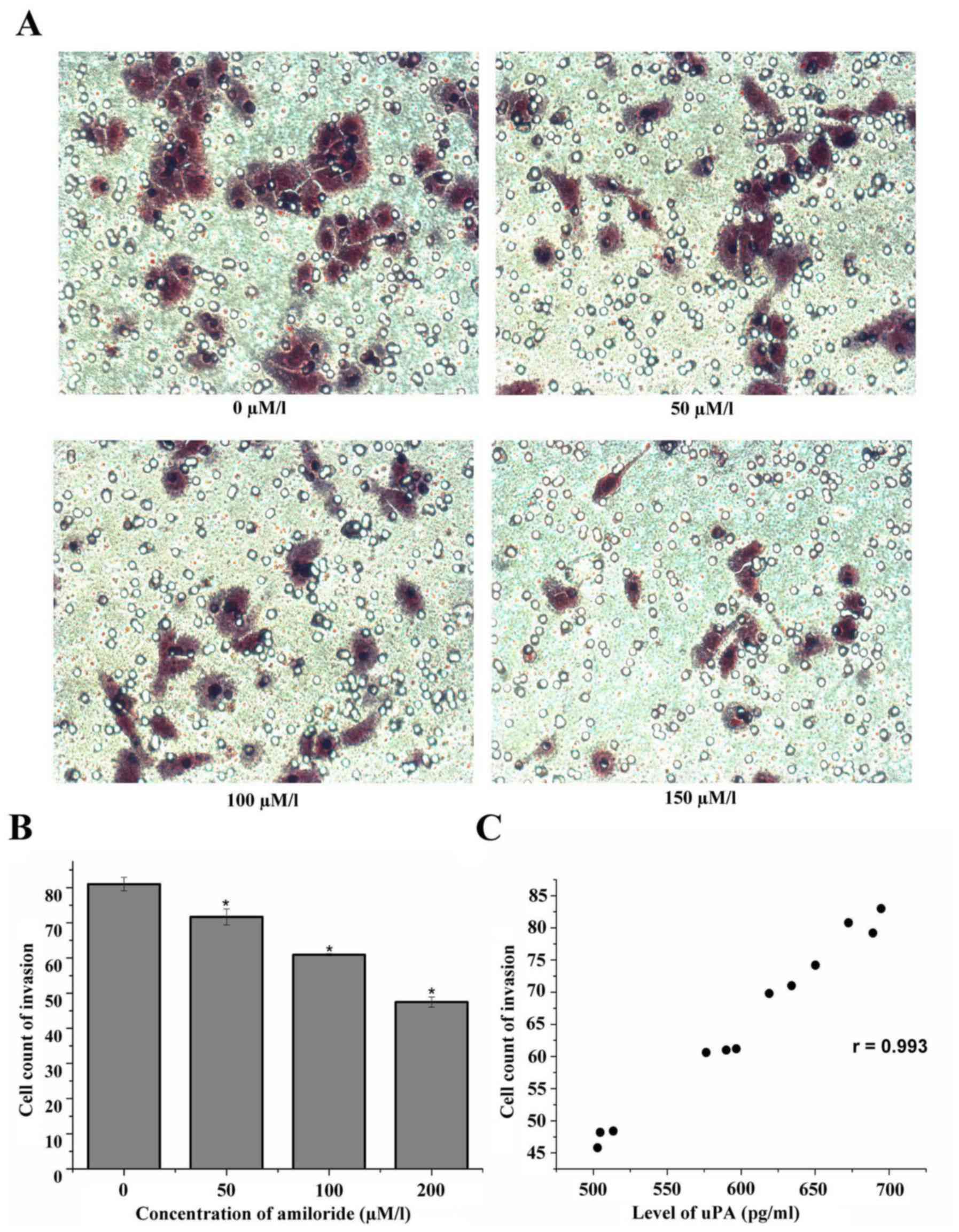|
1
|
de Sanjosé S, Diaz M, Castellsagué X,
Clifford G, Bruni L, Muñoz N and Bosch FX: Worldwide prevalence and
genotype distribution of cervical human papillomavirus DNA in women
with normal cytology: A meta-analysis. Lancet Infect Dis.
7:453–459. 2007. View Article : Google Scholar : PubMed/NCBI
|
|
2
|
Ferlay J, Shin HR, Bray F, Forman D,
Mathers C and Parkin DM: Estimates of worldwide burden of cancer in
2008: GLOBOCAN, 2008. Int J Cancer. 127:2893–2917. 2010. View Article : Google Scholar : PubMed/NCBI
|
|
3
|
Sahasrabuddhe VV, Parham GP, Mwanahamuntu
MH and Vermund SH: Cervical cancer prevention in low- and
middle-income countries: Feasible, affordable, essential. Cancer
Prev Res (Phila). 5:11–17. 2011. View Article : Google Scholar : PubMed/NCBI
|
|
4
|
Hildenbrand R, Allgayer H, Marx A and
Stroebel P: Modulators of the urokinase-type plasminogen activation
system for cancer. Expert Opin Invest Drugs. 19:641–652. 2010.
View Article : Google Scholar
|
|
5
|
Blasi F and Sidenius N: The urokinase
receptor: Focused cell surface proteolysis, cell adhesion and
signaling. FEBS Lett. 584:1923–1930. 2010. View Article : Google Scholar : PubMed/NCBI
|
|
6
|
Mekkawy AH, Morris DL and Pourgholami MH:
Urokinase plasminogen activator system as a potential target for
cancer therapy. Future Oncol. 5:1487–1499. 2009. View Article : Google Scholar : PubMed/NCBI
|
|
7
|
Daneri-Navarro A, Macias-Lopez G,
Oceguera-Villanueva A, Del Toro-Arreola S, Bravo-cuellar A,
Perez-montfort R and Orbach-arbouys S: Urokinase-type plasminogen
activator and plasminogen activator inhibitors (PAI-1 and PAI-2) in
extracts of invasive cervical carcinoma and precursor lesions. Eur
J Cancer. 34:566–569. 1998. View Article : Google Scholar : PubMed/NCBI
|
|
8
|
Santin AD, Cane' S, Bellone S, Bignotti E,
Palmieri M, De Las Casas LE, Anfossi S, Roman JJ, O'Brien T and
Pecorelli S: The novel serine protease tumor-associated
differentially expressed gene-15 (matriptase/MT-SP1) is highly
overexpressed in cervical carcinoma. Cancer. 98:1898–1904. 2003.
View Article : Google Scholar : PubMed/NCBI
|
|
9
|
Watanabe H: Extracellular
matrix-regulation of cancer invasion and metastasis. Gan To Kagaku
Ryoho. 37:2058–2061. 2010.PubMed/NCBI
|
|
10
|
Webb SL, Sanders AJ, Mason MD and Jiang
WG: Type II transmembrane serine protease (TTSP) deregulation in
cancer. Front Biosci. 16:539–552. 2011. View Article : Google Scholar
|
|
11
|
Zitka O, Kukacka J, Krizkova S, Huska D,
Adam V, Masarik M, Prusa R and Kizek R: Matrix metalloproteinases.
Curr Med Chem. 17:3751–3768. 2010. View Article : Google Scholar : PubMed/NCBI
|
|
12
|
List K: Matriptase: A culprit in cancer?
Future Oncol. 5:97–104. 2009. View Article : Google Scholar : PubMed/NCBI
|
|
13
|
Jankun J and Skrzypczakjankun E: Molecular
basis of specific inhibition of urokinase plasminogen activator by
amiloride. Cancer Biochem Biophys. 17:109–123. 1999.PubMed/NCBI
|
|
14
|
Vassalli JD and Belin D: Amiloride
selectively inhibits the urokinase-type plasminogen activator. FEBS
Lett. 214:187–191. 1987. View Article : Google Scholar : PubMed/NCBI
|
|
15
|
Livak KJ and Schmittgen TD: Analysis of
relative gene expression data using real-time quantitative PCR and
the 2(-Delta Delta C(T)) method. Methods. 25:402–408. 2001.
View Article : Google Scholar : PubMed/NCBI
|
|
16
|
Liu Y, Han Y, Zhang H, Nie L, Jiang Z, Fa
P, Gui Y and Cai Z: Synthetic miRNA-Mowers targeting miR-183-96-182
cluster or miR-210 inhibit growth and migration and induce
apoptosis in bladder cancer cells. PLoS One. 7:e522802012.
View Article : Google Scholar : PubMed/NCBI
|
|
17
|
Qi S, Song Y, Peng Y, Wang H, Long H, Yu
X, Li Z, Fang L, Wu A, Luo W, et al: ZEB2 mediates multiple
pathways regulating cell proliferation, migration, invasion and
apoptosis in glioma. PLoS One. 7:e388422012. View Article : Google Scholar : PubMed/NCBI
|
|
18
|
Mignatti P and Rifkin DB: Biology and
biochemistry of proteinases in tumor invasion. Physiol Rev.
73:161–195. 1993. View Article : Google Scholar : PubMed/NCBI
|
|
19
|
Jones JL and Walker RA: Control of matrix
metalloproteinase activity in cancer. J Pathol. 183:377–399. 1997.
View Article : Google Scholar : PubMed/NCBI
|
|
20
|
Lijnen HR: Matrix metalloproteinases and
cellular fibrinolytic activity. Biochemistry. 67:92–98.
2002.PubMed/NCBI
|
|
21
|
Overall CM and Kleifeld O: Tumour
microenvironment-opinion: Validating matrix metalloproteinases as
drug targets and anti-targets for cancer therapy. Nature Rev
Cancer. 6:227–239. 2006. View
Article : Google Scholar
|
|
22
|
Libra M, Scalisi A, Vella N, Clementi S,
Sorio R, Stivala F, Spandidos DA and Mazzarino C: Uterine cervical
carcinoma: Role of matrix metalloproteinases (Review). Int J Oncol.
34:897–903. 2009. View Article : Google Scholar : PubMed/NCBI
|
|
23
|
Baltazarrodriguez LM, Anayaventura A,
Andradesoto M, Monrroy-Guizar EA, Bautista-Lam JR, Jonguitud-Olguin
G, Cepeda-Lopez FR, Centeno-Aguilar VA, Gonzalez-Hernandez NA,
Soriano-Hernández AD, et al: Polymorphism in the matrix
metalloproteinase-2 gene promoter is associated with cervical
neoplasm risk in Mexican women. Biochem Genet. 46:137–144. 2008.
View Article : Google Scholar : PubMed/NCBI
|
|
24
|
Lin CY, Tseng IC, Chou FP, Su SF, Chen YW,
Johnson MD and Dickson RB: Zymogen activation, inhibition and
ectodomain shedding of matriptase. Front Biosci. 13:621–635. 2008.
View Article : Google Scholar : PubMed/NCBI
|
|
25
|
Lee JW, Song S, Choi JJ, Lee SJ, Kim BG,
Park CS, Lee JH, Lin CY, Dickson RB and Bae DS: Increased
expression of matriptase is associated with histopathologic grades
of cervical neoplasia. Hum Pathol. 36:626–633. 2005. View Article : Google Scholar : PubMed/NCBI
|
|
26
|
Danø K, Andreasen PA, Grøndahl-Hansen J,
Kristensen P, Nielsen LS and Skriver L: Plasminogen activators,
tissue degradation and cancer. Adv Cancer Res. 44:139–266. 1985.
View Article : Google Scholar : PubMed/NCBI
|
|
27
|
Saksela O and Rifkin DB: Cell-associated
plasminogen activation: regulation and physiological functions.
Annu Rev Cell Biol. 4:93–126. 1988. View Article : Google Scholar : PubMed/NCBI
|
|
28
|
Wang Y, Jones CJ and Dang J: Human
urokinase receptor expression is inhibited by amiloride and induced
by tumor necrosis factor and phorbol ester in colon cancer cells.
FEBS Lett. 353:138–142. 1994. View Article : Google Scholar : PubMed/NCBI
|
|
29
|
Wang Y, Dang J, Liang X and Doe WF:
Amiloride modulates urokinase gene expression at both transcription
and post-transcription levels in human colon cancer cells. Clin Exp
Metastasis. 13:196–202. 1995. View Article : Google Scholar : PubMed/NCBI
|
|
30
|
Klinghofer V, Stewart K, Mcgonigal T,
Smith R, Sarthy A, Nienaber V, Butler C, Dorwin S, Richardson P,
Weitzberg M, et al: Species specificity of amidine-based urokinase
inhibitors. Biochemistry. 40:9125–9131. 2001. View Article : Google Scholar : PubMed/NCBI
|
|
31
|
Park KS, Poburko D, Wollheim CB and
Demaurex N: Amiloride derivatives induce apoptosis by depleting ER
Ca(2+) stores in vascular endothelial cells. Br J Pharmacol.
156:1296–1304. 2009. View Article : Google Scholar : PubMed/NCBI
|
|
32
|
Matthews H, Ranson M and Kelso MJ:
Anti-tumour/metastasis effects of the potassium-sparing diuretic
amiloride: An orally active anti-cancer drug waiting for its
call-of-duty? Int J Cancer. 129:2051–2061. 2011. View Article : Google Scholar : PubMed/NCBI
|















